Opinions on Housing and Climate: Do Canadians Want a Climate-Centred Fix to Housing?
On behalf of the Task Force for Housing and Climate, Abacus Data conducted a national survey of 3,959 Canadians (18+) from August 29 to September 4, 2023, to assess perceptions related to the housing crisis and climate change.
In recent months, Canadians across the country have felt the effects of climate related events (e.g., forest fires, floods, extreme heat, high winds) as well as ongoing challenges associated with housing affordability (e.g., rising costs, interest rates, availability, etc.). In this survey, we delved into the concerns regarding climate change and housing while also assessing the level of interest in implementing a climate-focused solution to housing problems.
The results of the latest research underscore the intricate and interlinked character of public concerns in Canada. There is a clear priority placed on resolving housing affordability issues without compromising our climate objectives. The data reinforces the pivotal roles of industry, government, builders, and developers in addressing these pressing challenges.
CONCERNS RELATED TO CLIMATE CHANGE:
Results revealed that a significant majority of respondents, 76%, expressed concern about climate change, with only 8% reporting no concern at all. Moreover, in recent months, there has been a noticeable shift in Canadian attitudes towards climate change. Approximately 43% of Canadians have seen an uptick in their level of concern regarding its impacts. In contrast, nearly half of the population (48%) indicated that their level of concern has remained steady, with only a minority (8%) expressing a decrease in concern. These outcomes underscore the gravity of the climate change problem in the Canadian consciousness.
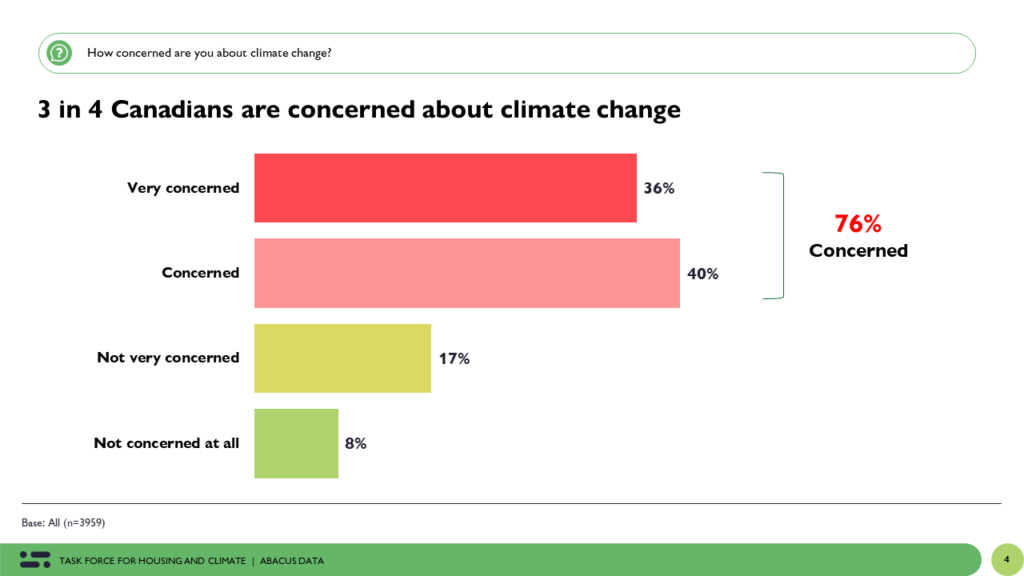
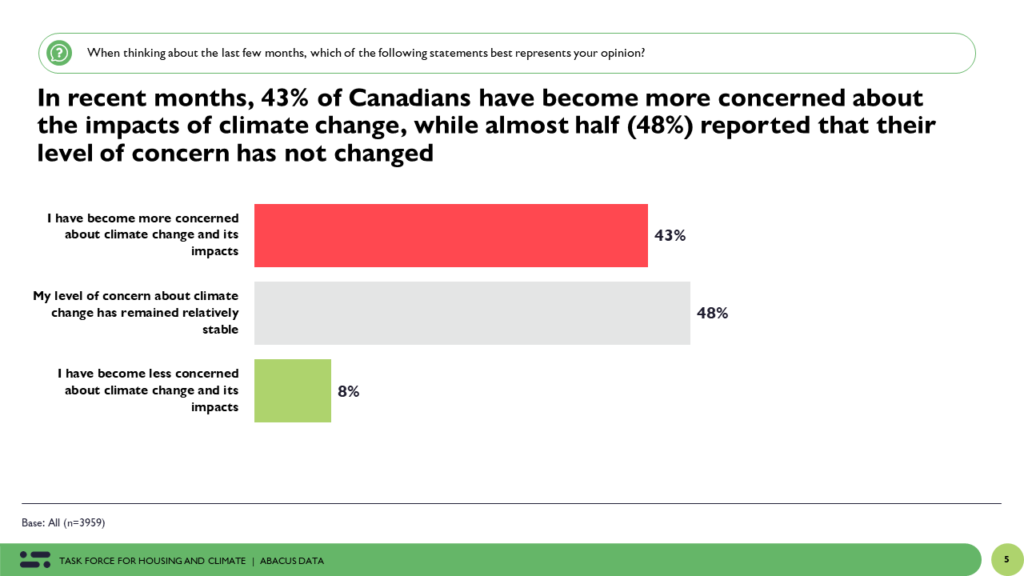
HOUSING AFFORDABILITY CONCERNS:
Much like climate change, housing affordability is a significant worry for Canadians, with over 85% expressing concerns about it. In recent months, more than half of Canadians (53%) have seen an increase in their level of concern regarding housing affordability, with noteworthy spikes in concern observed in younger age groups, specifically those aged 18-29 (67%) and 30-44 (58%), were more likely to report heightened concern. Housing affordability has become a major concern for nearly 9 in 10 Canadians over the past year, driven by factors such as interest rates, availability, and affordability.
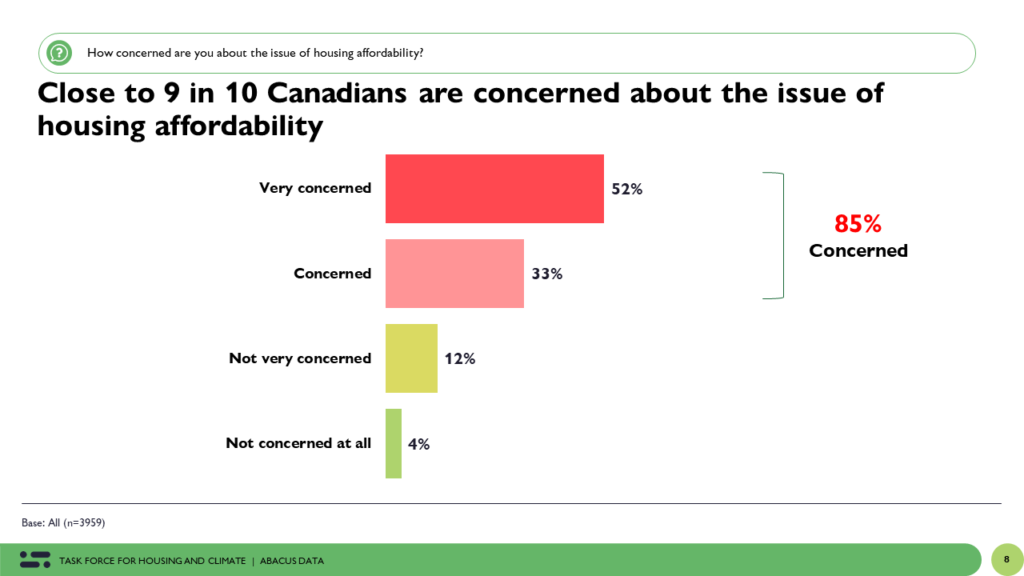
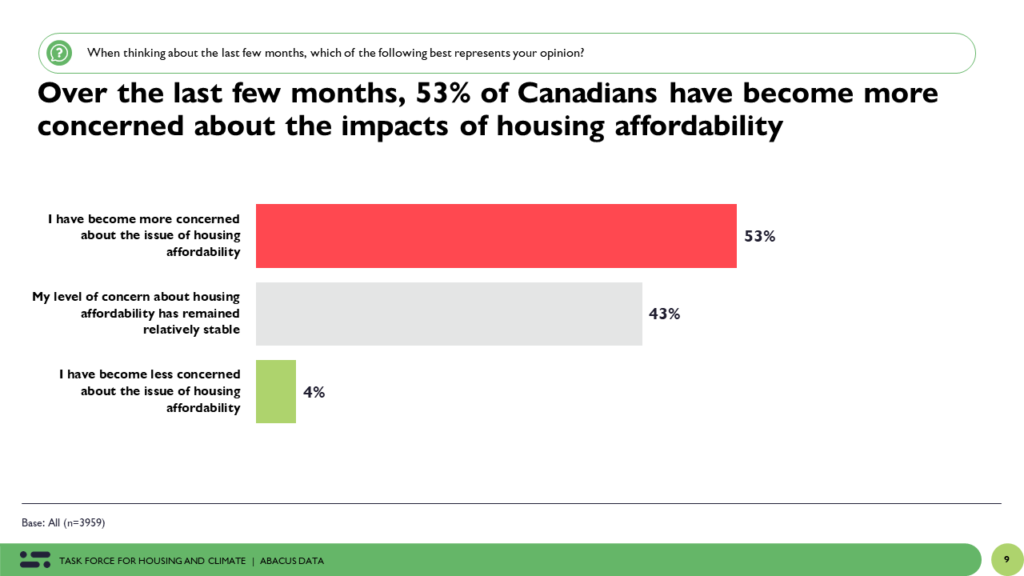
ADDRESSING HOUSING AFFORDABILITY WITHOUT COMPROMISING CLIMATE GOALS:
With increasing concerns relating to both climate change and housing, it is important to understand the dynamic between these two issues in the minds of Canadians. Results revealed that a significant portion of Canadians (62%) believe that it is important to address the housing affordability issue without compromising Canada’s climate goals.
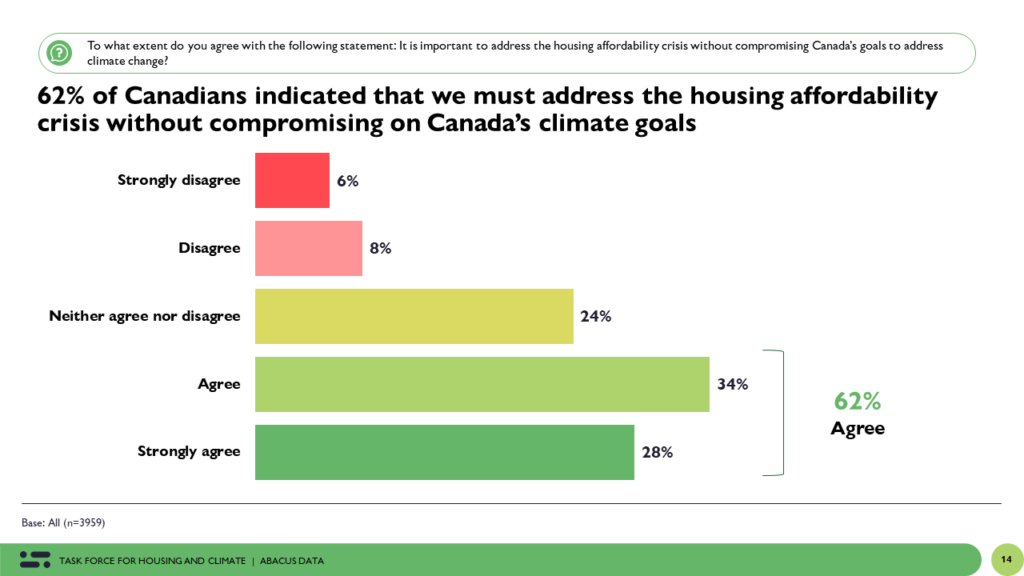
When considering sustainable living, a large majority of respondents believe that we must find ways to address housing challenges in a way that doesn’t harm the environment. Specifically, results revealed that: 78% of respondents emphasize the importance of constructing housing in ways that minimize pollution contributing to climate change; and 4 in 5 Canadians (84%) believe it is crucial to develop new housing in a manner that is resilient to the impacts of climate change.
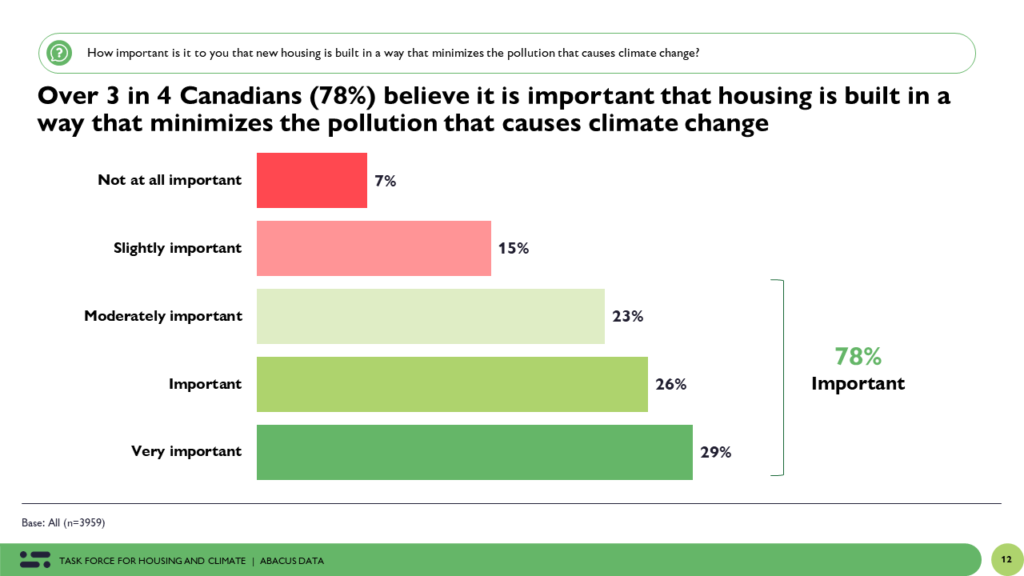
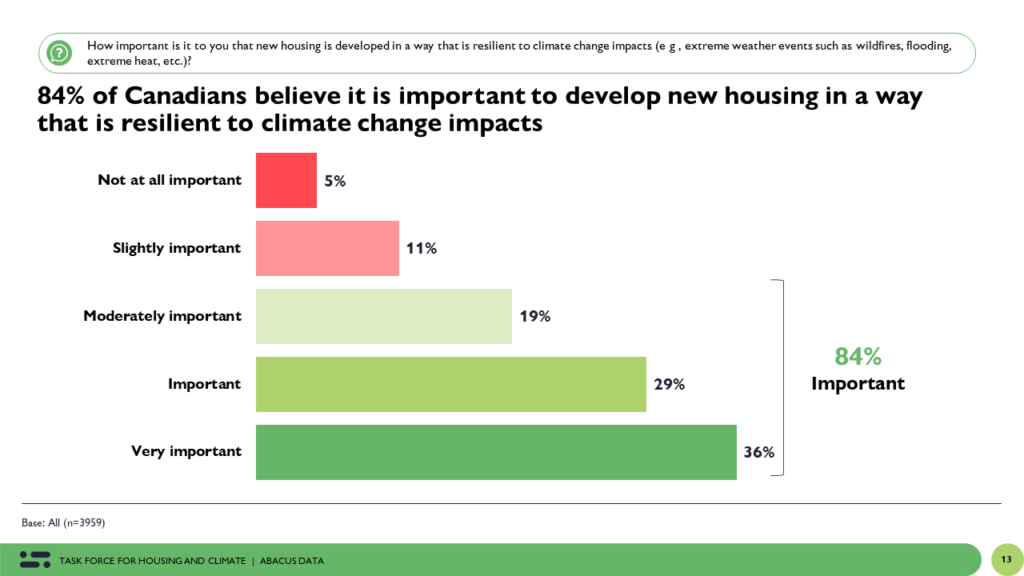
LEADERSHIP REQUIRED TO ACT:
When considering who should take leadership when addressing climate issues, the majority of respondents view industry (67%) and the federal government (65%) as the most important leaders in addressing climate change. Provincial (62%) and municipal governments (60%) are seen as being important, but to a slightly lesser degree than industry and the federal government.
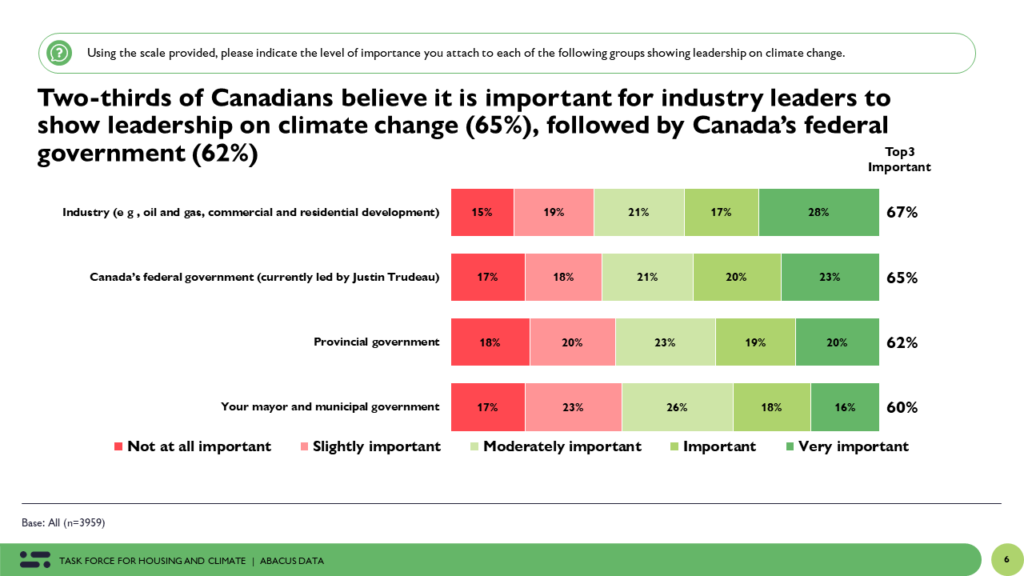
Conversely, when addressing housing affordability, respondents view the provincial government (70%) and builders/developers (69%) as the primary leaders responsible. Additionally, 67% of respondents feel that the federal government should assume a leadership role in addressing housing affordability, with municipal governments at 69%. These findings indicate that Canadians believe that addressing housing affordability is a collective effort that involves all levels of government.
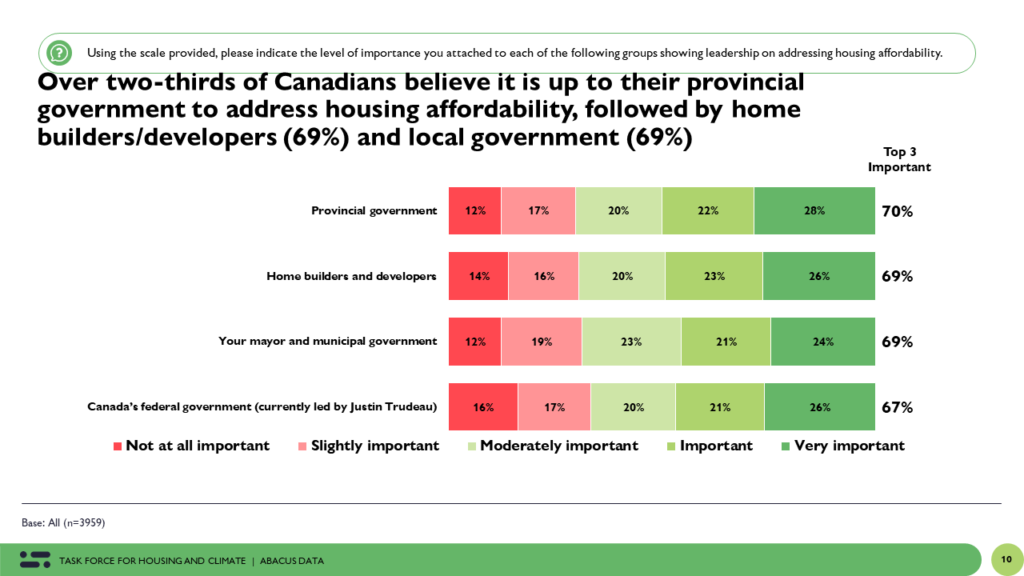
The Upshot
The current research underscores the intricate and interconnected landscape of public concerns in Canada. While it’s evident that Canadians express worries about both climate change and housing affordability, there’s a pronounced emphasis on the importance of tackling housing affordability without sacrificing our climate goals. This highlights their desire for a balanced approach that addresses affordability while simultaneously minimizing our environmental impact.
The data also emphasizes the crucial roles of industry, government, and builders/developers in addressing these issues. These results signify a notable shift in perspective regarding which level of government should take action to make a meaningful impact with Canadians increasingly looking to the federal government for climate change action and the provincial government for housing affordability solutions. It’s evident that Canadians perceive these issues as multifaceted and requiring action from all levels of government and industry.
Canadians are showing a rising level of worry regarding the affordability of housing and the issue of climate change. In this period when housing and climate concerns are at the forefront of Canadian consciousness, it is imperative for governments at all levels to pursue strategies that facilitate the creation of new, cost-effective, and environmentally friendly housing options. This will enable us to meet the increasing demand for housing without compromising our climate objectives.
Methodology
The survey was conducted with 3,959 Canadian adults from August 29 to September 4, 2023. A random sample of panelists were invited to complete the survey from a set of partner panels based on the Lucid exchange platform. These partners are typically double opt-in survey panels, blended to manage out potential skews in the data from a single source.
The margin of error for a comparable probability-based random sample of the same size is +/- 1.56%, 19 times out of 20.
The data were weighted according to census data to ensure that the sample matched Canada’s population according to age, gender, educational attainment, and region.
This survey was paid for by Abacus Data Inc.
Abacus Data follows the CRIC Public Opinion Research Standards and Disclosure Requirements that can be found here: https://canadianresearchinsightscouncil.ca/standards/
About Abacus Data
We are the only research and strategy firm that helps organizations respond to the disruptive risks and opportunities in a world where demographics and technology are changing more quickly than ever.
We are an innovative, fast-growing public opinion and marketing research consultancy. We use the latest technology, sound science, and deep experience to generate top-flight research-based advice to our clients. We offer global research capacity with a strong focus on customer service, attention to detail, and exceptional value.
We were one of the most accurate pollsters conducting research during the 2021 Canadian election following up on our outstanding record in 2019.
Contact us with any questions
Find out more about how we can help your organization by downloading our corporate profile and service offering.